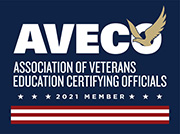
Benefits Summary
Below is an overview of the most commonly used VA Education Benefits. Each program has different eligibility requirements, payment rates, and rules for how benefits can be used.
The Montgomery GI Bill–Active Duty provides education benefits to Veterans and Service members who have served on active duty. Benefits can be used for degree and certificate programs, flight training, apprenticeships, and on-the-job training.
What it Covers:
- Monthly payments made directly to the student.
- Can be used for up to 36 months of education benefits.
Eligibility:
- At least two years of active duty service.
- Honorable discharge required.
- Participation requires an agreement to pay $1,200 during the first year of service.
- Benefits must generally be used within 10 years of separation from active duty.
The VR&E program assists Veterans with service-connected disabilities in preparing for, finding, and keeping suitable employment. If employment is not immediately feasible due to the severity of the disability, VR&E may also support independent living services.
What it Covers:
- Tuition and fees, books, and school supplies.
- Monthly housing allowance (similar to Post-9/11 GI Bill rates).
- Career counseling, job placement assistance, and support services.
- May also cover additional training needs for employment readiness.
Eligibility:
- Service-connected disability rating of at least 10%.
- Employment handicap due to service-connected disability.
- Services typically last up to 48 months but may be extended in some cases.
The Post-9/11 GI Bill provides comprehensive education benefits for Veterans and Service members who served after September 10, 2001. It is one of the most widely used VA education programs.
What it Covers:
- Tuition and fees (paid directly to the school, up to the in-state rate).
- Monthly housing allowance (based on BAH rates for your school’s location).
- Up to $1,000 annually for books and supplies.
Eligibility:
- At least 90 days of active duty service after September 10, 2001, or 30 days with a service-connected discharge.
- Benefit level (percentage paid) depends on length of service.
- Benefits are typically available for 15 years after last qualifying active duty service (the time limit has been removed for those who left service after January 1, 2013, under the “Forever GI Bill”).
Service members may transfer unused Post-9/11 GI Bill benefits to a spouse or dependent children. This option must be approved by the Department of Defense while the Service member is still serving.
What it Covers:
- Same benefits as Post-9/11 GI Bill (tuition, housing, books).
- Spouses may use transferred benefits immediately.
- Children may use benefits after the Service member has completed 10 years of service.
Eligibility:
- Must be on active duty at the time of request.
- Must have completed at least 6 years of service and agree to serve an additional 4 years.
- Dependents must be enrolled in DEERS (Defense Enrollment Eligibility Reporting System).
The Fry Scholarship provides Post-9/11 GI Bill benefits to the children and surviving spouses of Service members who died in the line of duty after September 10, 2001.
What it Covers:
- Tuition and fees (paid directly to the school, up to the in-state rate).
- Monthly housing allowance.
- Up to $1,000 annually for books and supplies.
- Up to 36 months of benefits.
Eligibility:
- Children of eligible Service members (may use benefits until age 33).
- Surviving spouses (benefits available for up to 15 years after the Service member’s death, unless remarried).
The DEA program offers education and training opportunities to eligible dependents of certain Veterans. Benefits can be used for college, career training, apprenticeships, or on-the-job training.
What it Covers:
- Monthly payments made directly to the student.
- Up to 36 months of education benefits.
Eligibility:
- Child or spouse of a Veteran who is permanently and totally disabled due to a service-connected disability.
- Child or spouse of a Veteran who died while on active duty or from a service-connected disability.
- Children must generally use benefits between ages 18–26 (there is no time limit if you became eligible for DEA on or after August 1, 2023 or you turned 18 years old on or after August 1, 2023, or you completed high school or received your GED on or after August 1, 2023).
The MGIB-SR provides education benefits to members of the Selected Reserve, including all Reserve components and the National Guard.
What it Covers:
- Monthly payments made directly to the student.
- Up to 36 months of education benefits.
- May be used for degree and certificate programs, apprenticeships, flight training, and other approved programs.
Eligibility:
- Must have a six-year obligation to serve in the Selected Reserve.
- Must remain in good standing with your Reserve or National Guard unit.
- Benefits typically end on the day you leave the Selected Reserve.

